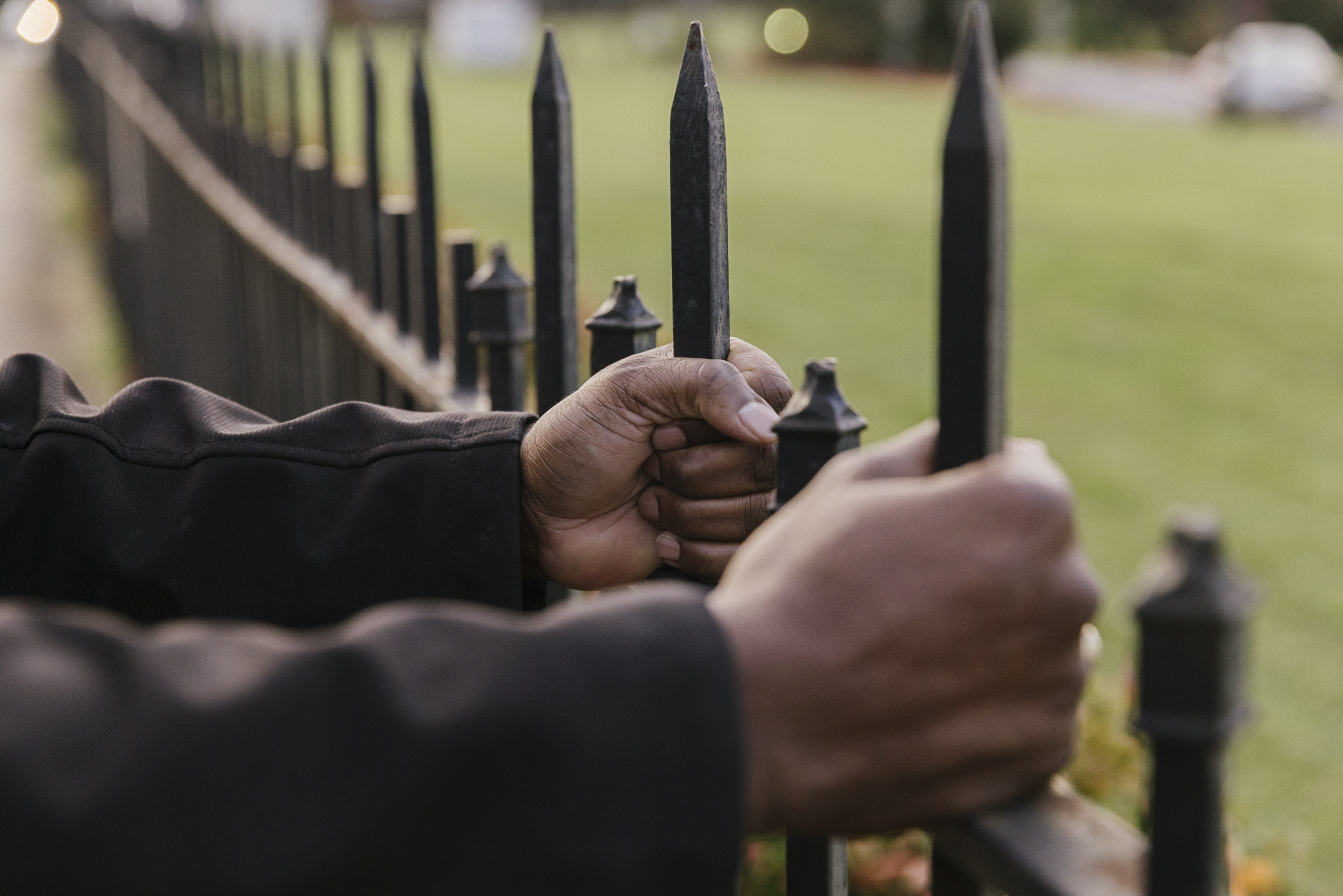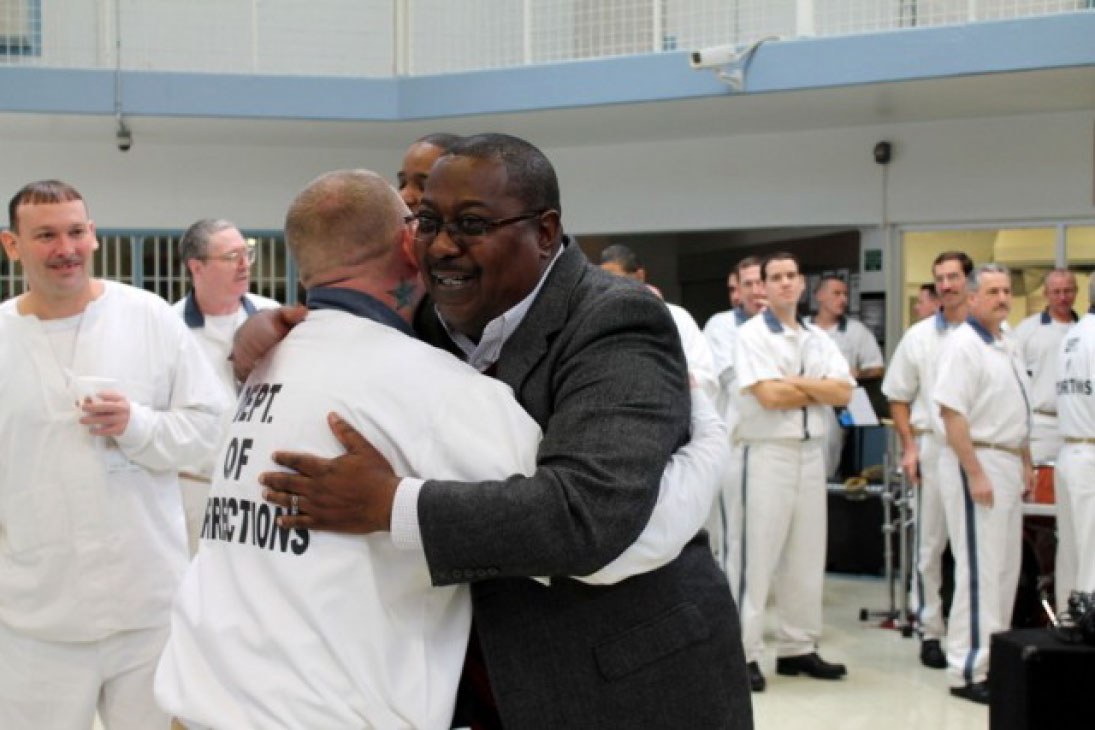Removing roadblocks to redemption: How 10 U.S. think tanks are getting criminal justice right
- Date:

AJ Skiera | Associate Director of Marketing and Communications
A JUST SOCIETY REQUIRES THAT THOSE WHO COMMIT CRIMES STAND PUNISHMENT for their deeds before being allowed to reenter society. Yet, the punishment often doesn’t fit the crime, and even when it does, many are denied the tools to effectively become productive citizens after they’ve paid their debts. It has increasingly become the case in the United States that roadblocks to redemption are created by the very system that seeks to rehabilitate.
Several of Atlas Network’s domestic partners are putting forth both research and action to bring much-needed reform to a country that has less than 5 percent of the world’s population, yet nearly 25 percent of the world’s prison population. Criminal justice in the U.S. has a number of areas where smart reforms can help thousands of people recapture lost economic opportunity and gain a renewed outlook on life. This is the story of what Atlas Network’s partners are doing to advance criminal justice reform in the U.S.
Criminal justice reform is a multifaceted issue needing multifaceted solutions. Atlas Network’s partners are leveraging their comparative advantages to achieve policy reform and improve outcomes of those who go through the correctional system. Identifying areas such as civil forfeiture (or civil asset forfeiture), barriers to prisoner reentry, occupational licensing, coercive plea-bargaining, overcriminalization, and sentencing reform, many state-based public policy groups are working to improve their backyards while national organizations advocate change at the highest level.
"It has increasingly become the case in the United States that roadblocks to redemption are created by the very system that seeks to rehabilitate."
'Policing for Profit:' Civil Forfeiture
The northern Virginia-based Institute for Justice (IJ) is a national law firm that litigates to limit the size and scope of government power and protect Americans’ economic freedom. Its apparatus has grown considerably since 1991 to encompass strategic research, boots-on-the-ground activism, communications, and legislative outreach in addition to litigating on behalf of individuals. IJ is widely considered to be a thought leader of civil forfeiture reform.
Civil forfeiture allows the government to take and sell one’s property on the mere suspicion that it might be connected to criminal activity and without requiring the individual to be charged with a crime. This troubling practice has created perverse incentives for police departments around the country including receiving a portion or all of the proceeds from civil forfeiture. Police are given the power to seize property at-will and create an uphill legal battle for those seeking to get it back.
IJ provides the most comprehensive guide to civil forfeiture laws and data at the state and federal levels with its flagship publication, Policing for Profit: The Abuse of Civil Asset Forfeiture, which has become the go-to source for media and policymakers interested in the issue.
"No one should lose their property without being convicted of a crime, and law enforcement should not have a financial incentive to pursue property."
Since 2010, IJ has brought 18 cases challenging unjust civil forfeitures at the state and federal levels and has filed several amicus briefs with the U.S. Supreme Court and other courts to raise awareness about the lack of due process and perverse incentives that drive abuse of civil forfeiture.
“Over the past seven years, IJ has secured the return of at least $4.7 million worth of unjustly seized property for our clients,” said Lisa Knepper, IJ’s director of strategic research. “And just since 2014, 25 states and the District of Columbia have enacted forfeiture reforms legislatively. These include the abolition of civil forfeiture in New Mexico, the elimination of the profit incentive in D.C. and New Mexico, improved transparency in Arizona and Colorado and other states, and stronger procedural protections in a number of states.”


Its list of victories does not stop there. Through a class-action lawsuit, IJ ended several troublesome aspects of Philadelphia’s abuse of civil forfeiture that regularly harmed innocent citizens. The pressure IJ built through litigation, research, and communications also forced the IRS to roll back its forfeiture program after exposing the agency’s abuse of so-called “structuring laws” to seize the bank accounts of law-abiding small business owners. Citing IJ research, Supreme Court Justice Clarence Thomas issued a concurring opinion in 2017 questioning whether civil forfeiture can be reconciled with the Constitution. IJ cases and research were also cited in reports made by inspectors general for the Departments of Justice and Treasury, who warned of the high risk of abuse.
With more than 250 editorials calling for the demise of civil forfeiture being published since 2014, IJ’s End Forfeiture initiative has been driving the national conversation on the issue. It has received feature coverage from high-profile outlets including The New York Times, The Washington Post, CBS Evening News, and HBO’s “Last Week Tonight with John Oliver.”

“IJ’s goal is to end civil forfeiture,” continued Knepper. “No one should lose their cash, car, home or other property without being convicted of a crime, and law enforcement should not have a financial incentive to pursue property. Short of abolishing civil forfeiture, our work aims to eliminate the profit incentive, to strengthen property owners’ rights when challenging unjust forfeitures, and to achieve meaningful transparency and accountability for forfeiture programs.”
Two other nationally minded organizations advocating reform in civil forfeiture are the Charles Koch Foundation (CKF) and Institute (CKI). Both organizations focus on five specific areas of the criminal justice system they deem most in need of reform: sentencing, second chances, overcriminalization, civil forfeiture, and policing practices.
“The first step to any reform is identifying the problems in the status quo and developing solutions,” said Jordan Richardson, attorney and senior policy and research analyst at CKI. “To that end, the Charles Koch Foundation awarded a grant to the Sandra Day O'Connor College of Law at Arizona State University to publish a groundbreaking new report titled Reforming Criminal Justice. With contributions from over 120 of the nation's leading academics, the four-volume publication contains detailed analysis and specific policy proposals for over 57 different issues in the criminal justice system. Already, academics and policymakers across the country are using this unrivaled publication to help educate about the next steps for reform.”
"At least 95% of all state prisoners will be released from prison at some point. It makes sense to ensure that our corrections system will set them up for success."
CKF and CKI seek to “identify the best ideas that can improve public safety and promote individual rights and human dignity, while making victims whole,” Richardson continued. “We seek to advance these goals by providing opportunities for open dialogue, through public forums and events, research, and writing, as well as supporting academic research to bring solutions for long-term change.”
In their work, CKF and CKI court traditional and nontraditional allies alike by hosting events such as the “Advancing Justice Summit: An Agenda for Human Dignity and Public Safety,” where nearly 400 leading academics, law enforcement professionals, policy makers, think tank scholars, community advocates, and other influencers convened to discuss the most urgent priorities for criminal justice and policing reform. Earlier in 2017, CKI hosted an event at the multimedia festival SXSW with award-winning rapper Snoop Dogg to discuss the need for sentencing reform.
“Perhaps what is most important to conservatives is that criminal justice reform is about human dignity, the idea that no one should be defined by their worst day, and the hope for redemption and a second chance,” Richardson said. “At least 95 percent of all state prisoners will be released from prison at some point. It makes sense to ensure that our corrections system will set them up for success.”

Overcoming Barriers to Opportunity for Ex-Offenders
Upholding the rule of law requires that those who commit crimes be appropriately punished for their actions. Oftentimes, though, there are barriers for formerly incarcerated individuals to effectively reenter society after proper penance has been paid. Many state-based public policy groups are working to remove the barriers to prisoner reentry so that ex-offenders can have a renewed and revitalized outlook on life.
Georgia
The Georgia Center for Opportunity (GCO)’s Prisoner Reentry Initiative was a finalist for the Templeton Freedom Award in 2017. The project included a working group of experts who made heavily vetted criminal justice reform recommendations, which were subsequently implemented by the state. A parallel campaign called, “Hiring Well, Doing Good” challenges community stakeholders and businesses to create opportunities for ex-offenders to find employment. GCO aims to break the cycle of poverty and ensure that every Georgian has the greatest opportunity for success.
"A criminal record often presents employment barriers for returning citizens...our initiatives aim to pave the way for ex-offenders to successfully rejoin society."
“A criminal record often presents employment barriers for returning citizens, resulting in high rates of recidivism,” said Randy Hicks, president and chief executive officer of GCO. “Because work is so much more than a paycheck, our initiatives aim to pave the way for ex-offenders to successfully rejoin society and find purpose and dignity, starting with a stable job.”
Nearly all of GCO’s policy recommendations from its working group have been passed into law or resulted in agency-level changes. One success story was Georgia becoming the first state in the South to “ban the box” for public sector employment, which removes from hiring applications the check box that asks whether applicants have a criminal record. The practice of suspending the driver’s licenses of those who are behind in child support payments was ended, and Parental Accountability Courts were expanded, which reduce incarceration and encourage parents to support their children. The state predicts there will be an associated 11 percent drop in recidivism in the next few years.
GCO’s pilot Atlanta-area Hiring Well, Doing Good employment initiative, which has grown to include more than 40 business and community partners, is preparing to launch a second program in Columbus, Ga., and is working with other groups to replicate similar efforts in other states. The reforms spearheaded by GCO are driving a 6 percent drop in Georgia’s prison population since 2012 – a $264 million savings for taxpayers.
“By demonstrating that our policy proposals are beneficial to all Georgia families while remaining financially practical for the state, we have been able to overcome barriers faced by other groups in the state capitol,” Hicks said.

Tennessee
The Beacon Center of Tennessee focuses on the “bookends of the system, prioritizing juvenile justice reforms so that the juvenile system is not just a feeder into adult prisons, and on the back end focusing on reentry reforms that will eliminate barriers that make it harder for those leaving prison to become productive members of society,” said Justin Owen, president and chief executive officer of the Beacon Center.
The Beacon Center has partnered with organizations such as the American Civil Liberties Union, Goodwill, Chamber of Commerce, and Tennessee County Services Association (which represents local government officials) to form the Tennessee Coalition for Sensible Justice, which leads the charge of advancing sensible reforms in the state.
"When right- and left-leaning organizations like Beacon and ACLU team up, it gets attention. In our first year working on this issue, we have advanced common sense reforms."
In the Beacon Center’s first year of work on reform, it has advanced two important juvenile justice reforms: now juveniles who are eligible to have their record cleared will be notified of this opportunity by their judge and those who have a juvenile record can now have it expunged at age 17 instead of 18, allowing them to apply for jobs, trade schools, or college. The Beacon Center also helped scale back a law that required those leaving prison to pay off their court fees and fines within one year or risk losing their driver's license, often a necessity to get and keep a job. Now, those with an inability to pay can have their fees and fines waived, and others who continue to make payments on a plan cannot lose their license.
“When right- and left-leaning organizations like Beacon and ACLU team up, it gets attention,” Owen said. “In just our first year working on this issue, we have bridged a gap and advanced common sense reforms. And now with our governor, chief justice, and other state leaders giving serious attention to this issue, we are poised to make an even bigger impact over the next few years.”
Illinois
Occupational licensing restrictions pose another barrier to effective reentry in states around the country – states such as Illinois, where nearly half of those released from state prisons each year will return within three years. One driving force of recidivism – which costs an average of $118,000 in Illinois, according to the Illinois Sentencing Policy Advisory Council – is a lack of opportunity, with 60-75 percent of former offenders being unemployed a year after their release. Illinois Policy Institute has identified occupational licensing as an actionable area for smart reform to create more opportunity for ex-offenders.
“Our research lays the groundwork for how to achieve meaningful reform, and it also makes a compelling case to lawmakers, and those across the ideological spectrum as to why criminal justice reform matters,” said Hilary Gowins, vice president of communications at Illinois Policy Institute. “We talk to everyone – people concerned with fiscal responsibility and social justice alike – about why criminal justice reform matters to them. … But most importantly, we change policy by showing how bad rules harm real people. It’s why we told the story of Lisa Creason, a mother from Decatur, Ill.”
"We talk to everyone about why criminal justice reform matters to them... But most importantly, we change policy by showing how bad rules harm real people."
After spending a year in prison for attempted robbery, Creason determined to become a nurse. She worked full-time as a certified nursing assistant and attended school part-time to earn her nursing degree – all while raising three children on her own after her fiancé was killed. However, the state refused to grant her a nursing license due to her decades-old felony conviction (a crime of desperation she committed in order to attempt to provide for her daughter). Illinois Policy Institute championed Lisa’s cause, and eventually, the state made a change. Gov. Bruce Rauner signed a bill in August 2016 that allows ex-offenders such as Lisa to pursue health care worker licenses. Illinois Policy Institute also partnered with the ACLU of Illinois to produce original research on civil forfeiture that spurred a reaction in the media and state capitol, with lawmakers subsequently passing a law that shifts the burden of proof from the property owner to the government and that also removes other troublesome provisions of state civil forfeiture laws.
“Too often, fact-based research is missing from the criminal justice debate,” Gowins said. “We fight for solutions that are not only moral but also make sense and fix problems. That gives us the power to shape the narrative and highlight solutions that will help ex-offenders and taxpayers alike.”

Due Process, Overcriminalization, and Legislative Reform
In late January of this year the Alabama Policy Institute introduced a bill that champions strong civil forfeiture reform to help restore transparency to a broken system and to bring Alabama law in accord with the due process clause of the U.S. Constitution.
“Since no conviction is required, civil asset forfeiture is inherently flawed,” said Leigh Hixon, Alabama Policy Institute’s senior director of policy relations. “The due process clause of the Fifth and Fourteenth Amendments of the United States Constitution – which prohibits citizens from being ‘deprived of life, liberty, or property, without due process of law’ – is ignored when this practice is used.”
Historically, almost all crimes had two components – the bad act, and the guilty mind (mens rea) – and both were required to convict a person. This ensured that bad acts were punished criminally, but accidents were not. Over time and with new criminal legislation, the guilty mind standard began to be omitted. In 2014, The Buckeye Institute in Ohio helped to usher in the nation’s first and best mens rea reform package – setting a default guilty mind standard that the state government must prove to get a conviction. The reforms essentially said that people should not be convicted of a crime for making an honest mistake.
"Ohio’s criminal justice system sends too many people to prison and does little to address underlying problems such as drug addiction and lack of employment."
The Buckeye Institute also worked with Ohio policymakers to accomplish civil forfeiture reform in 2016. Due to Buckeye, it is now harder for the state government to take private property without proving the owner committed a crime. The reforms also limit state law enforcement participation in federal civil forfeiture programs that do not adequately protect private property.
The Buckeye Institute is a leader in many other areas of criminal justice reform. It successfully pushed for non-violent, non-sex, non-trafficking offenders to be rehabilitated through treatment programs, to give judges greater discretion in sending defendants to rehabilitation programs and in sealing records, successfully advocated for probation reform, and is a thought leader on bail reform. Daniel J. Dew, a legal fellow at Buckeye, advised Ohio’s Criminal Justice Recodification Committee, which had been tasked by the state’s legislature to review Ohio’s entire criminal code and develop policy recommendations to improve the system. Dew was also named to the Ohio Sentencing Commission’s Justice Reinvestment 2.0 Committee, along with other practitioners and experts, who are reviewing sentencing, probation, and other criminal justice issues facing Ohio. The Committee’s goal is to develop ways for the state to safely reduce its prison population.
“Ohio’s criminal justice system sends too many people to prison and does little to address underlying problems such as drug addiction and lack of employment,” said Robert Alt, president and CEO of The Buckeye Institute. “Our goal is to make our communities safer, cut spending, and help people become contributing members of society. Through our work and our successes, we are keeping communities safe through fair processes, fair laws, and just outcomes.”

The Utah-based Libertas Institute has identified several areas to improve concerning due process in the state. This includes the pre-trial release system – bail reform – to incorporate a risk assessment into Utah courts. It also wants to end driver’s license suspensions for non-driving drug offenses, reduce dozens of current Class B misdemeanors to infractions, limit the amount of time a person can be held without being charged with a crime or released post-arrest, make it a felony for prosecutors to withhold exculpatory evidence from the defense, and require higher standards for the judicial review of warrants, especially e-warrants for forcible entry.
“Due process isn't just a goal or something that would be nice to achieve, it’s a right of every individual,” said Michael Melendez, director of policy at Libertas Institute. “A person from any background could be destroyed by the inherent unfairness of the current system and we want to see a clearly visible change in how the system currently operates. … We've been successful in reducing the use of civil asset forfeiture, reforming forcible entry laws, requiring the widespread use of body cameras, [and] outlawing the use of a variety of new technologies (radar, cell data interception, drones) by law enforcement without first obtaining a warrant.”
"Due process...is a right of every individual. A person from any background could be destroyed by the inherent unfairness of the current system."
The Cato Institute’s Project on Criminal Justice targets what it identifies as four fundamental problems with America’s criminal justice system: unconstitutional overcriminalization, self-defeating-policing, coercive plea-bargaining, and limited accountability for police and prosecutors.
“Today, more than 95 percent of criminal convictions are obtained through plea bargains rather than jury trials,” said Clark Neily, Cato Institute’s vice president for criminal justice. “This number is deeply concerning because with fewer and fewer defendants exercising their constitutional right to a jury trial, there is less and less opportunity for citizens to participate in the criminal justice system – and to provide the oversight and feedback that are crucial to maintaining a transparent, just, and accountable criminal justice system. … Together, unconstitutional overcriminalization and coercive plea bargaining have created a wood-chipper criminal justice system that sucks in citizens and spits out convicts.”
Overcriminalization refers to the proliferation of criminal rules and regulations that make illegal thousands of harmless activities. Enforcement of this unjustifiably large criminal code is often selective and unduly aggressive and, as a result, strains the relationship between communities and police. A cycle of self-defeating policing is created as a focus is taken away from enforcing important criminal laws such as robbery and murder and instead placed on enforcing laws that everyday citizens are not aware of, such as shipping lobster tails in plastic bags or using the wrong procedure to clean up toilet overflows.
“Unfortunately, the plea-bargaining process can be extraordinarily coercive, with prosecutors routinely stacking up multiple charges and invoking mandatory minimums in an effort to induce defendants to give up their right to a jury trial and take whatever deal the prosecutor feels like offering. The result has been the practical elimination of citizen participation in the criminal justice system, resulting in a massive loss of transparency and accountability, the consequences of which we are only beginning to fully appreciate.”
The Cato Institute’s program of rigorous and reputable research is helping shape a national conversation on the areas needing reform described above. It hosts policy forums and annual criminal justice conferences to bring together reformers running the gamut of the political spectrum to advance bipartisan solutions to easily solved problems.
Perhaps the most influential work on criminal justice reform taking place in the network is the Texas Public Policy Foundation (TPPF)’s Right on Crime initiative. TPPF’s prior work on criminal justice reform led to a 2007 overhaul in Texas, which quickly led to reform spreading across the country by late 2008. A Templeton Freedom Award finalist in 2013, Right on Crime now has directors in eight states and three staff members based in the nation’s capital. While providing scholarship and research, TPPF also markets its policy recommendations to policymakers, testifies before legislative bodies, drafts legislation, and hosts events.
“In terms of our issue areas, we focus on adult corrections, juvenile justice, overcriminalization, civil asset forfeiture, and policing,” said Marc Levin, vice president of criminal justice policy at TPPF. “We promote solutions that enhance public safety by reducing re-offending, particularly the types of crimes that are most harmful to other people. By the same token, we advocate for alternatives to incarceration for people who are not a threat to others. We have seen tremendous progress, for example, in reducing the number of people in prison for low-level drug cases as policymakers have realized better results for public safety, taxpayers, and the offenders can be achieved by reining in the historical overreliance on prisons.”
TPPF seeks to maximize ordered liberty by having a criminal justice system that imposes the least restrictive intervention necessary to protect life and property. This is partially achieved by reducing thousands of unnecessary criminal laws that touch normal business and leisure activities. “For example, in Texas, there are more than 1,500 criminal laws and in Arizona, there are more than 2,000 criminal laws,” Levin said. “At the federal level, the Congressional Research Service counted more than 4,500 before giving up. Most of these laws, like the 11 felonies in Texas relating to harvesting oysters, do not concern conduct that the average person would think of as criminal and many lack a mens rea or intent requirement.”
"Since we began our criminal justice work in 2005, Texas opted against building more prisons and has reduced its incarceration rate by 20% while achieving a 31% reduction in its crime rate."
TPPF’s credibility and authority have won it considerable buy-in from a variety of stakeholders both in Texas and beyond. Most of the states with high incarceration rates tend to be “red states” that are governed by conservatives who look to TPPF and its work for policy solutions. More than 90 well-known thought leaders have also signed on to Right on Crime’s Statement of Principles including, Connor Boyack, president of the Utah-based Libertas Institute; Grover Norquist, president of Americans for Tax Reform; Michael Carnuccio, president and chief executive officer of the E Foundation for Oklahoma; Stephen Moore, a writer and economic policy analyst; and many others.
“We are perhaps most known for the dramatic changes we contributed to in Texas since we began our criminal justice work in March 2005,” Levin said. “Since then, Texas opted against building more prisons and has reduced its incarceration rate by 20 percent while achieving a 31 percent reduction in its crime rate. Not only has Texas not built prisons, but eight adult prisons and nine juvenile lockups have been closed since 2008.”
Justice reinvestment policies combine saving tax dollars and redirecting some funds that would have been spent on incarceration to more cost-effective alternatives. The example of Texas – combined with the work of Right on Crime in dozens of states – has inspired more than 35 states to adopt similar policies in the past decade.
The Road Ahead
While the organizations listed above have taken different approaches to advancing criminal justice reform, a similar current runs through them all. Assembling and working in coalitions of nontraditional allies have yielded positive results when translating policy proposals into law and practice. Criminal justice has all the trappings of a bipartisan issue, and several groups on the right and left are beginning to realize that to the betterment of American society.
All of society stands to benefit when access to opportunity is expanded, unnecessary barriers are removed, incentives are properly aligned, and legal protections are enforced. Formerly incarcerated individuals who are able to find and keep employment find fulfillment for themselves and their families and an associated shrinkage of the incarceration rate saves the state and taxpayers money. There are many opportunities for reform and they all work to bring about a brighter future, where prosperity and opportunity touch all—regardless of the mistakes made earlier in life.
"All of society stands to benefit when access to opportunity is expanded, unnecessary barriers are removed, incentives are properly aligned, and legal protections are enforced."